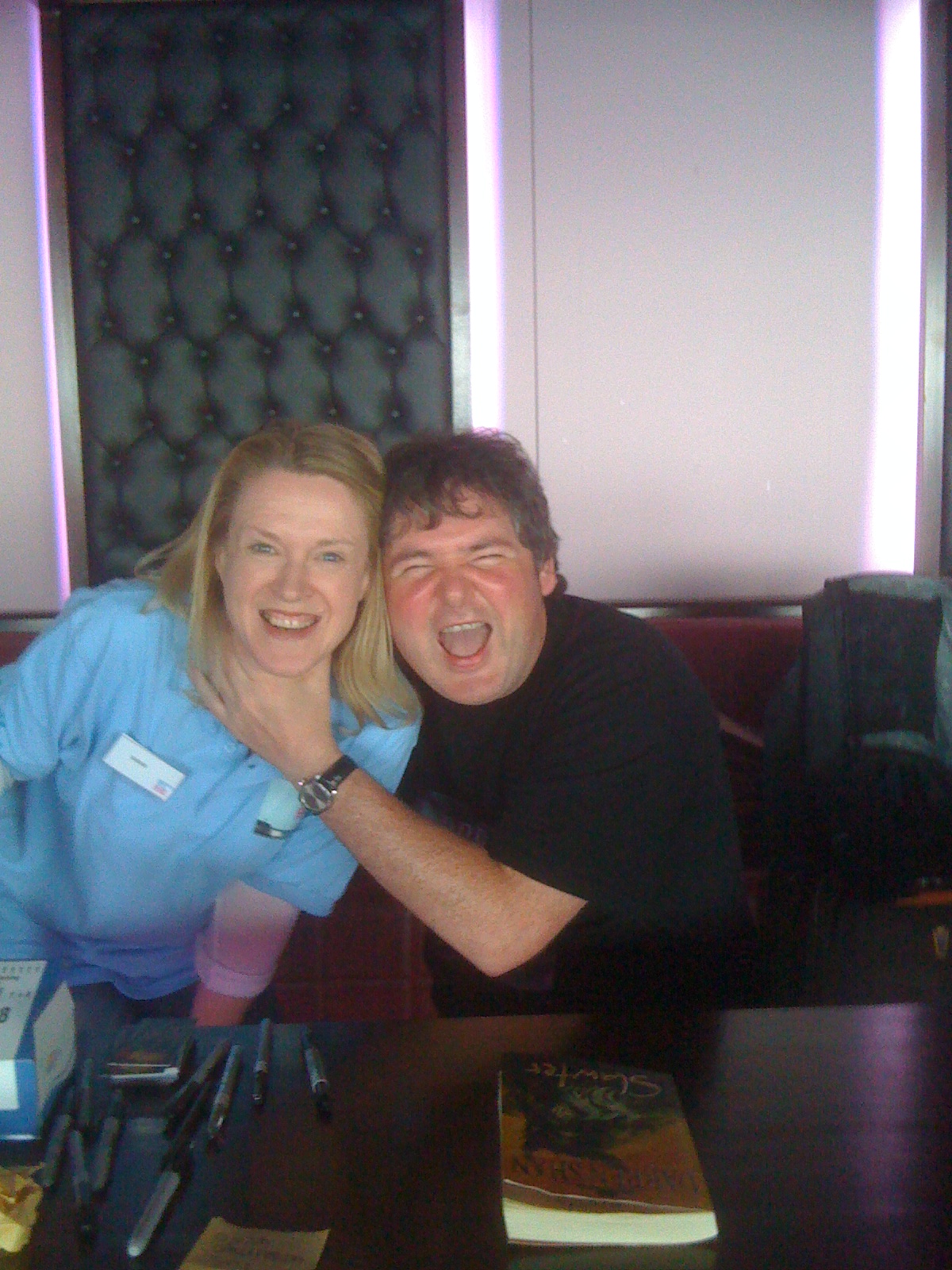Welcome to week seven of Write That Book. If you’ve just stumbled upon this blog, weeks one to six, covering getting started, characters, plot and editing may also be of use to you.
Once you’ve finished your manuscript and have rewritten it many, many times and copy-edited it meticulously, you will need to find an agent or a publisher. I’ll deal with why you need an agent below (and in some cases you don’t), but first, titles.
Book Titles
Book titles are very important. They say a lot about a book. Some writers find titles easy, for others it’s like pulling teeth. And it can differ with every book.
In the world of popular fiction/romantic comedy, I’ve always liked Katie Fforde’s titles: Thyme Out, Practically Perfect, Highland Fling. Maeve Binchy’s titles are also excellent – simple and catchy - Tara Road, Nights of Rain and Stars, Circle of Friends.
On the children’s side, I’ve always loved the quirky Are You There, God? It’s Me, Margaret as a title. It shouldn't work, but it does. How to Train Your Dragon, The Boy in the Striped Pyjamas, Under the Hawthorne Tree, Ballet Shoes, Skulduggery Pleasant, Artemis Fowl – all fantastic, memorable titles. It’s hard to define what makes a good title. It must be simple and catchy, but it must also say something about the book.
So spend time getting your title right.
Writing a Proposal for an Agent
So you’ve finished your book, made it as perfect as you can (after many, many edits and rewrites) and you’re finally ready for the journey to publication. Some publishers will accept unsolicited manuscripts, but many of the larger publishers only accept submissions from agents.
If your book is a local history of Dublin, you can send it directly to an Irish publisher, and we’ll talk more about this, along with self-publishing, next week. If your book is a novel, and you’d like to see it published in the UK, all over Europe and the US, as well as in Ireland, you will need an agent.
Preparing your manuscript
Presentation is so important. Your manuscript must look professional. Make sure the pages are freshly printed out and look pristine. Make sure your covering letter is clear and polite. Include any personal details that you think are relevant and interesting - your experience living in an exotic country where the book is set from for example, working in the circus in your teens, your years as a ballerina/ballet teacher - but keep it brief and succinct.
Make sure your manuscript is neatly printed on plain white A4 paper, using double spaces and easy to read (eg Times New Roman) 12 point type; and make sure every page is numbered. Put your name, address and telephone number clearly on the title page, as well as the title of the book, and place a large elastic band around the pages. Don’t staple the pages together and don’t bind your manuscript - agents like to be able to read manuscripts on the train and in bed.
Some agents prefer a synopsis and a few sample chapters first, check with each agent for details before sending anything to them. Place the whole lot in a jiffy bag, and cross your fingers.
These days, some agents read most of their submissions on their Kindle or iPad, make sure to ring or email and ask how they like submissions before you send anything off. Be warned – sometimes you will ring an agent’s office and they will answer the phone themselves. And they may ask you to tell them about your book right then and there. Be prepared! This happened to me once and I was caught completely on the hop. I didn’t have my notes in front of me and I was hideously tongue tied. (In my case it didn’t actually matter – but it could have!)
This is what you will need to send an agent:
A brief, polite and informative covering letter
A brief biog – especially anything exciting or book related. Are you a librarian, bookseller, teacher, bee keeper, lion tamer?
A brief blurb (like you’d find on the back of a book – sell your book to the agent in 3 or 4 lines)
A synopsis of the whole novel – 2 to 3 pages
Character biographies of your main characters – to show you know who they are (I’m not sure if this is standard, but I always do it)
The first few chapters depending on their length – about 30 to 50 pages – ask how many chapters/pages the agent would like to see.
Most agents ask for the first few chapters; if they like them, they will request the entire manuscript. So you’d better make those first few chapters REALLY, REALLY GOOD. Never say in your letter ‘These aren’t the strongest chapters, it does get much better later on’. Never send an extract from the middle of the book.
And finally all agents want career writers, people who want to write lots of books, not just one book. So it’s a good idea to tell them what other book ideas you have, or what other books you have also written.
They want writers they feel they can work with, who are professional, hard working and in control of their work. They want writers who know what they are doing and have confidence in their own work, writers who aren’t afraid of rewrites, who take the business of writing seriously. Is that you?
Why Do I Need an Agent?
People often me ask this and I tell them the following:
The Irish publishing world is quite small and very few writers could survive writing only for the home market. This is where agents come in – to find international publishers for Irish writers, and to sell foreign rights.
There are many reasons why agents are useful:
1/ An agent can advise you on your manuscript and on how to make it more attractive to a publisher. Some of them, like my wonderful agents (I have two agents – in the same agency – one for my children’s books, another for my books for grown-ups) will act as unofficial ‘editors’ to their clients, or can, at the very least, suggest changes or improvements. Many are in fact ex-editors and are highly qualified for this work.
2/ An agent can find the right publisher for your work. Good agents will know what kind of areas particular publishers are looking to publish in at the moment. And they can sell your UK, US and other foreign rights.
3/ Agents deal with the difficult and technical area of contracts. They are also experts in digital rights and ebooks, which is an area that is becoming more and more important for writers.
4/ Money – they can chase up your royalties and talk to your publishers about outstanding monies owed to you.
5/ Good agents make you want to up your game – they make you want to write better books. Which is always a good thing! Ditto good editors – more on that next week.
Agents can be found in the Writers and Artists’ Yearbook. It can take a while for them to get back to you (up to 3 months). It used to be good practice to approach them one at a time, but these days it is perfectly acceptable to approach several at the same time. Of course, if you get an agent, do let other agents you have sent submissions to know, it’s only good manners and you don’t want to waste their time.
There are only a few literary agents in Ireland, the main ones being Jonathan Williams, Faith O’Grady and Marianne Gunn O’Connor (Details below or in the Writers and Artists’ Yearbook as above – or google them). Many Irish authors are with UK agents.
Contact the chosen agent and find out what they would like to see – for some it’s a few chapters, for others it’s the whole manuscript, plus news cuttings, reviews, biog, photo - anything relevant. Even the top agencies are always looking for new talent so don’t be put off by the fact that they represent Cecelia Ahern, JK Rowling or Marian Keyes.
See below for a list of recommended children’s agents and popular fiction agents. And finally I will leave you with some tips from the experienced Irish agent, Faith O’Grady:
Top Tips from Faith O’Grady, Literary Agent at the Lisa Richards Agency
1. Do some research on the literary agency before submitting your work to
find out if they handle your particular genre. It is worth making a brief
phone call or looking up the agency website to find out what their
requirements for submission are. Agencies have different submission policies
so it is worth finding out what they are looking for.
2. Write a cover letter which is clear and concise, giving a brief
description of your book and of yourself. Don't exaggerate or oversell yourself or the book as this is quite off-putting.
3. Include an sae if you would like your work returned. And don't expect an
immediate response as most agencies are inundated with unsolicited
manuscripts.
And next week - the final week - we will deal with publishers and self publishing . . .
Who Represents Who?The Agents Who Represent the Most Successful Irish Children’s Writers (with Contact Details)
Remember to check each agent’s website for submission guidelines before you send anything out. Or ring the agency for details – I know it’s daunting but they are always happy to advise you on how (or if) to submit. Be warned – you may get the agent herself/himself on the phone. Be prepared!
Eoin Colfer is represented by Sophie Hicks.
sophie@edvictor.com
0044 (0) 2073044100
Derek Landy is represented by Michelle Kass
(Who also represents the wonderful Patrick Ness)
office@michellekass.co.uk
0044 (0) 207 74391624
Darren Shan is represented by Christopher Little
Christopher Little Literary Agency
10 Eel Brook Studios
125 Moore Park Road
London SW6 4PS
Tel: +44 (0) 207 736 4455
Fax: +44 (0) 207 736 4490
For general enquiries please email: info@christopherlittle.net
Sarah Webb (moi!) is represented by Philippa Milnes Smith at LAW
Contact: All submissions should be sent, in hard copy, by post to:
LAW, 14 Vernon Street, London, W14 0RJ
www.lawagency.co.uk
Cathy Cassidy is represented by Darley Anderson (Spends a lot of time in Ireland and a lovely woman so I’ve included her!)
Contact: Darley Anderson Literary, TV and Film Agency
Estelle House
11 Eustace Road
London SW6 1JB
Tel: 00 44 (0)20 7385 6652
Fax:00 44 (0)20 7386 5571
Email: enquiries@darleyanderson.com
Judi Curtin and Marita Conlon McKenna are represented by Caroline Sheldon
Contact via:
www.carolinesheldon.co.uk
71 Hillgate Place, London W8 7SS
Other Recommended Children’s Agents:
Julia Churchill
Greenhouse Literary Agency
If you want to make a submission, we take e-queries only, please.
To Julia at submissions@greenhouseliterary.com. Check our submission guidelines on this site for full information before querying. Please note, we no longer accept snail-mail queries or email attachments.
We are sorry that we cannot take (or return) phone queries regarding submissions.
Eve White, Eve White Literary Agency
(represents Andy ‘Mr Gum’ Stanton)
eve@evewhite.co.uk
00 44 (0) 207 6301155
Veronique Baxter at David Higham
Contact: David Higham Associates
5–8 Lower John Street
Golden Square
London W1F 9HA
Switchboard: 00 44 (0)20 7434 5900
Fax: 044 (0)20 7437 1072
E-mail: dha@davidhigham.co.uk
Who Represents Who?Irish Popular Fiction Writers and Their Agents with Contact Details
Remember to check each agent’s website before you send anything out for submission guidelines.
Maeve Binchy is represented by Christine Green
Contact: 0044 (0) 20 7401 8844
info@christinegreen.co.uk
Christine Green Authors' Agent
6 Whitehorse Mews
Westminster Bridge Road
London SE1 7QD
Marian Keyes, Cathy Kelly and Monica McInerney are all represented by Jonathan Lloyd (also CEO of Curtis Brown)
Contact: 0044 (0)20 7393 4418
lucia@curtisbrown.co.ukwww.curtisbrown.co.uk
Sheila O’Flanagan is represented by Carole Blake
Contact: Blake Friedmann Literary, Film & TV Agency
122 Arlington Road
London NW1 7HP
Telephone: 00 44 (0)20 7284 0408
Fax: 00 44 (0) 20 7284 0442
email: info@blakefriedmann.co.uk
Cecelia Ahern is represented by Marianne Gunn O’Connor
Marianne also represents Claudia Carroll, Anita Notaro and Sinead Moriarty
Contact: Marianne Gunn O'Connor Literary Agency
Morrison Chambers, Suite 17
32 Nassau Street, Dublin 2
mgoclitagency@eircom.net
Melissa Hill is represented by Sheila Crowley
Sheila also represents Colette Caddle, Emma Hannigan and Sarah Harte
Contact: 00 44 (0)20 7393 4492
crowleyoffice@curtisbrown.co.uk
Sarah Webb is represented by Peta Nightingale at LAW
(LAW also represent Sophie Kinsella – Irish name, but not actually Irish!)
Contact: All submissions should be sent, in hard copy, by post to:
LAW, 14 Vernon Street, London, W14 0RJ
www.lawagency.co.uk
Clare Dowling is represented by Darley Anderson
Contact: Darley Anderson Literary, TV and Film Agency
Estelle House
11 Eustace Road
London SW6 1JB
Tel: 00 44 (0)20 7385 6652
Fax:00 44 (0)20 7386 5571
Email: enquiries@darleyanderson.com
Marita Conlon McKenna is represented by Caroline Sheldon
Contact via:
www.carolinesheldon.co.uk
71 Hillgate Place, London W8 7SS
Patricia Scanlan is represented by Lutyens & Rubenstein Literary Agency
Contact via: www.lutyensrubinstein.co.uk
21 Kensington Park Road, London W11 2EU
Other Recommended Popular Fiction Agents:
Madeleine Buston at Darley Anderson
Contact: Darley Anderson Literary, TV and Film Agency
Estelle House
11 Eustace Road
London SW6 1JB
Tel: 0 44 (0)20 7385 6652
Fax: 0 44 (0)20 7386 5571
Email: enquiries@darleyanderson.com
Lizzie Kremer at David Higham
Contact: David Higham Associates
5–8 Lower John Street
Golden Square
London W1F 9HA
Switchboard: 00 44 (0)20 7434 5900
Fax: 044 (0)20 7437 1072
E-mail: dha@davidhigham.co.uk









